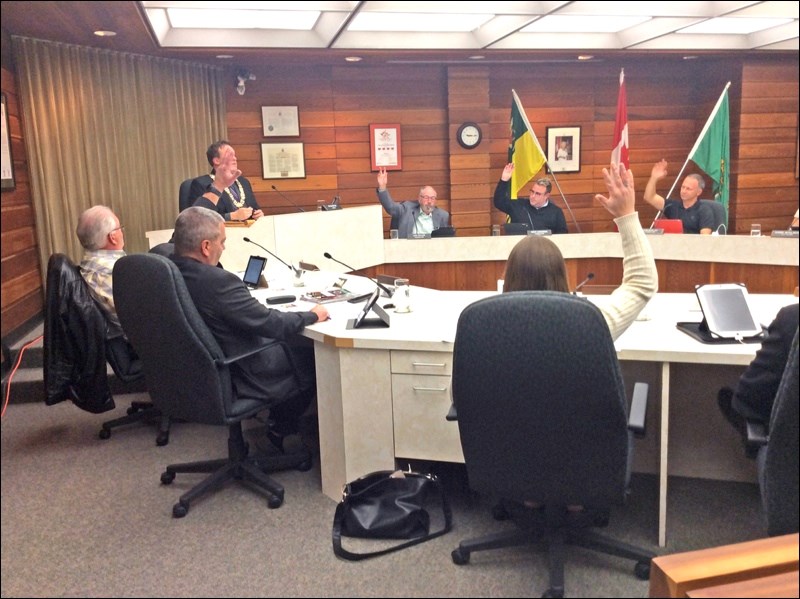Changes to the panhandling bylaw came to a crashing halt Tuesday night at city council.
The amendments would have increased the distance from 10 meters to 100 meters in front of ATMs, liquor stores and bus stops and other places where people were not allowed to panhandle in the city, among other provisions.
But the amendments were defeated on third reading by a 5-2 vote.
The changes had also been supported by business owners and local residents who had complained about harassment from individuals downtown. Councillors at Tuesday’s meeting relayed stories from people about being harassed for money by crowds of people at street corners, or even of people surrounding their automobiles at parking lots.
The existing panhandling bylaw already prohibited aggressive panhandling. But the changes were introduced, according to city manager Jim Puffalt, at the request of the RCMP who believed the existing bylaw was not sufficient to give them enough tools to deal with the safety issues downtown.
The panhandling bylaw changes have drawn opposition, however, with opponents questioning whether further restrictions on panhandling were the right approach.
On Monday night, council heard from lawyer Ben Feist on behalf of a delegation opposing the bylaw changes.
The first concern, Feist said, was with the “public policy considerations” with the bylaw, whether “this is really an effective approach to what we’re trying to solve in the community.”
He questioned whether handing out tickets to those in poverty was the right approach, and whether it would push the problem elsewhere out of downtown and to other areas of the city.
The other concern Feist raised was the constitutional Charter issues involved with raising the restriction on panhandling to 100 meters.
The bylaw would “have the effect of being a blanket ban” on panhandling, and those bans have been found unconstitutional throughout North America, Feist said.
Council also received correspondence from Erin Katerynych, executive director of the Battlefords and District Food and Resource Centre, who stated the bylaw change was “not the optimal solution to current concerns.”
She also voiced the concern that the bylaw would “simply relocate the current concerns to other neighbourhoods, rather than address the core supports required by vulnerable community members.”
“Through actively collaborating and connecting community resources and supports, and effectively enforcing the current bylaw in the downtown area, I feel that this would provide a better more inclusive decision for all community stakeholders,” stated Katerynych.
When third reading of the bylaw came up for discussion later in the meeting, councillors who had previously voted in favour of first and second reading made it clear they had second thoughts.
“It’s given me a little bit of time to reflect what are we trying to accomplish here,” said Councillor Kelli Hawtin. “What’s our end goal of what we’re doing?”
She pointed out most of those who were in favour of the bylaw changes had pointed to the need to address safety issues downtown, such as people being harassed or followed to their car.
But “none of those people told me they felt unsafe because they were peacefully asked for $10,” said Hawtin.
Other councillors, including Councillor. Kevin Steinborn and Councillor Len Taylor also pulled their support for the amendments, though Taylor did express a desire to address the numerous issues with safety downtown, pointing to one occasion near the liquor store where he was harassed.
“People have got to feel safe coming downtown,” said Taylor.
Councillor Kent Lindgren, who had opposed first and second reading, maintained his staunch opposition to the bylaw throughout.
“The more we look at this, the more to me it becomes obvious it’s not actually solving the issues it’s proposing it solves,” said Lindgren.
Others on council did not change their vote. Councillor Greg Lightfoot voted in favor, pointing to the feedback he’d gotten from businesses and residents who wanted to see addressed the aggressive nature of the panhandling going on.
He also pointed to complaints from people who were concerned about being followed to their cars, and of businesses that had to hire extra security or employ a “buddy system” so people could safely get to their vehicles after hours.
“There has to be some major changes somewhere,” said Lightfoot.
“It’s the same group of people doing this on a consistent basis. It has to be dealt with.”
Mayor Bater also maintained his support for the bylaw amendments, saying he “fully supports” their community safety strategy and all the initiatives to address the root causes of crime and poverty in the community.
He pointed to stories he’s heard from people about “intimidation” they had felt downtown. “I want to give law enforcement the tools they need,” said Bater.
In the end the final vote was 5-2 against third reading of the panhandling bylaw amendments.
Now, the question is where does the city go from here to deal with the safety issues raised at the meeting.
In speaking to reporters, Mayor Bater indicated more discussions would be needed.
“I think we will engage with our partners in the RCMP detachment, we’ll engage with the city administration to look at alternative policy solutions to what was presented,” said Bater.
“For now, I think the desire by council to see some change exists. I think it’s just a matter of finding the right policy that meets the needs of council.”




